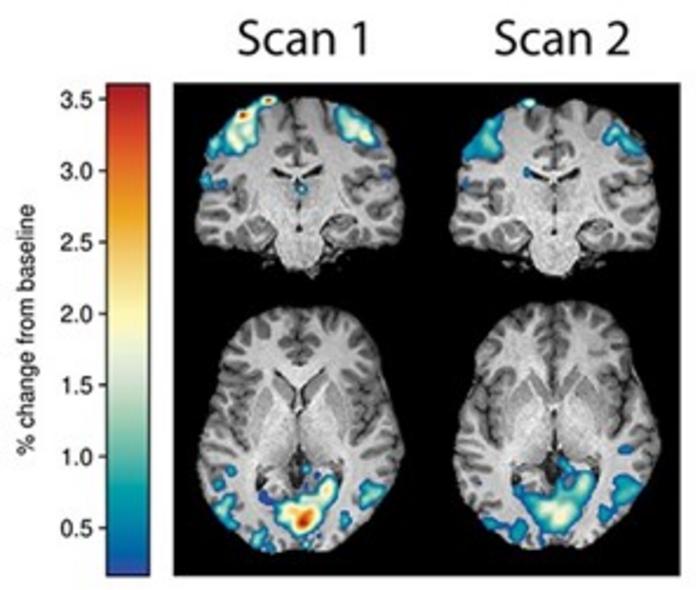As part of its ongoing quest to advance better brain health and performance, new research led by Center for BrainHealth at The University of Texas at Dallas investigated neural biomarkers associated with improvements on a brain health index.

Credit: Center for BrainHealth
As part of its ongoing quest to advance better brain health and performance, new research led by Center for BrainHealth at The University of Texas at Dallas investigated neural biomarkers associated with improvements on a brain health index.
The study, “Toward Precision Brain Health: Accurate Prediction of a Cognitive Index Trajectory Using Neuroimaging Metrics,” was recently published in Cerebral Cortex
A total of 48 participants aged 21–65 completed a simple task during a functional magnetic resonance imaging (fMRI) session, then once again approximately six months later after engaging in cognitive training protocols. The researchers derived neural biomarkers from the brain’s hemodynamic (blood flow) response to the task.
At these same time points, participants completed a battery of online cognitive assessments that measure memory, strategic attention and innovation – these holistic assessments produce a composite score of the brain’s holistic fitness, called the BrainHealth Index.
The researchers then trained a machine learning model to predict improvements on the BrainHealth Index based only on the neural markers measured from both visits.
Whereas the BrainHealth Index is derived from self-reported assessments, neural biomarkers provide an objective, physical measure of what is happening in the brain. Just as cholesterol levels are a common biomarker for heart health and heart disease, neural biomarkers can serve not only as early warning systems of brain pathology, but also as markers of improved brain health – as this study demonstrates.
The optimized machine learning model successfully predicted substantial gain on the BrainHealth Index with 90% accuracy, confirming a functional relationship between the Index and the neural biomarkers in a healthy population.
Lead author and director of biostatistics Jeffrey S. Spence, Ph.D., explained, “This study is unique in that our team used a brain biomarker to track brain health rather than disease. Establishing such a clear functional relationship between the BrainHealth Index and this neural biomarker reinforces the value of the Index to measure the state of one’s brain health – without the need for expensive imaging procedures.”
Contributing author Sandra Bond Chapman, Ph.D., founder and chief director at Center for BrainHealth and Dee Wyly Distinguished Professor at UT Dallas stated, “To our knowledge, this is one of the first studies to demonstrate predictive markers of improved brain health with combined neural changes and behavioral gains following cognitive training in young to older age healthy adults.”
“Group findings show statistical significance, but clinical significance is achieved when we can specify at an individual level who benefits or fails to respond to different treatment protocols,” she continued.
“This study takes us one step closer to precision brain health, which will ultimately allow interventions to be tailored to individuals.”This study, focused on markers of brain improvement, was graciously supported by private philanthropy from Sammons Enterprises, Inc.
ABOUT CENTER FOR BRAINHEALTH
Center for BrainHealth®, part of The University of Texas at Dallas, is a translational research institute committed to enhancing, preserving, and restoring brain health across the lifespan. Major research areas include the use of functional and structural neuroimaging techniques to better understand the neurobiology supporting cognition and emotion in health and disease. This leading-edge scientific exploration is translated quickly into practical innovations to improve how people think, work and live, empowering people of all ages to unlock their brain potential. Translational innovations build on Strategic Memory Advanced Reasoning Tactics (SMART™), a proprietary methodology developed and tested by BrainHealth researchers and other teams over three decades.ABOUT CENTER FOR BRAINHEALTHCenter for BrainHealth®, part of The University of Texas at Dallas, is a translational research institute committed to enhancing, preserving, and restoring brain health across the lifespan. Major research areas include the use of functional and structural neuroimaging techniques to better understand the neurobiology supporting cognition and emotion in health and disease. This leading-edge scientific exploration is translated quickly into practical innovations to improve how people think, work and live, empowering people of all ages to unlock their brain potential. Translational innovations build on Strategic Memory Advanced Reasoning Tactics (SMART™), a proprietary methodology developed and tested by BrainHealth researchers and other teams over three decades.
Journal
Cerebral Cortex
DOI
10.1093/cercor/bhad435
Method of Research
Randomized controlled/clinical trial
Subject of Research
People
Article Title
Toward precision brain health: accurate prediction of a cognitive index trajectory using neuroimaging metrics
Article Publication Date
15-Nov-2023




